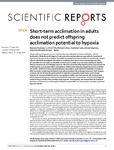Short-term acclimation in adults does not predict offspring acclimation potential to hypoxia
| dc.contributor.author | Truebano, M | |
| dc.contributor.author | Feistel, Susanne | |
| dc.contributor.author | Collins, M | |
| dc.contributor.author | Clarke, C | |
| dc.contributor.author | Shipsides, E | |
| dc.contributor.author | Wheatley, C | |
| dc.contributor.author | Spicer, John | |
| dc.date.accessioned | 2018-03-19T13:48:57Z | |
| dc.date.available | 2018-03-19T13:48:57Z | |
| dc.date.issued | 2018-12 | |
| dc.identifier.issn | 2045-2322 | |
| dc.identifier.issn | 2045-2322 | |
| dc.identifier.other | 3174 | |
| dc.identifier.uri | http://hdl.handle.net/10026.1/11105 | |
| dc.description.abstract |
<jats:title>Abstract</jats:title><jats:p>The prevalence of hypoxic areas in coastal waters is predicted to increase and lead to reduced biodiversity. While the adult stages of many estuarine invertebrates can cope with short periods of hypoxia, it remains unclear whether that ability is present if animals are bred and reared under chronic hypoxia. We firstly investigated the effect of moderate, short-term environmental hypoxia (40% air saturation for one week) on metabolic performance in adults of an estuarine amphipod, and the fitness consequences of prolonged exposure. We then reared the offspring of hypoxia-exposed parents under hypoxia, and assessed their oxyregulatory ability under declining oxygen tensions as juveniles and adults. Adults from the parental generation were able to acclimate their metabolism to hypoxia after one week, employing mechanisms typically associated with prolonged exposure. Their progeny, however, did not develop the adult pattern of respiratory regulation when reared under chronic hypoxia, but instead exhibited a poorer oxyregulatory ability than their parents. We conclude that species apparently hypoxia-tolerant when tested in short-term experiments, could be physiologically compromised as adults if they develop under hypoxia. Consequently, we propose that the increased prevalence of hypoxia in coastal regions will have marked effects in some species currently considered hypoxia tolerant.</jats:p> | |
| dc.format.extent | 0-0 | |
| dc.format.medium | Electronic | |
| dc.language | en | |
| dc.language.iso | en | |
| dc.publisher | Springer Science and Business Media LLC | |
| dc.subject | Acclimatization | |
| dc.subject | Amphipoda | |
| dc.subject | Animals | |
| dc.subject | Oxygen | |
| dc.subject | Time Factors | |
| dc.title | Short-term acclimation in adults does not predict offspring acclimation potential to hypoxia | |
| dc.type | journal-article | |
| dc.type | Journal Article | |
| dc.type | Research Support, Non-U.S. Gov't | |
| plymouth.author-url | https://www.webofscience.com/api/gateway?GWVersion=2&SrcApp=PARTNER_APP&SrcAuth=LinksAMR&KeyUT=WOS:000425285200004&DestLinkType=FullRecord&DestApp=ALL_WOS&UsrCustomerID=11bb513d99f797142bcfeffcc58ea008 | |
| plymouth.issue | 1 | |
| plymouth.volume | 8 | |
| plymouth.publication-status | Published online | |
| plymouth.journal | Scientific Reports | |
| dc.identifier.doi | 10.1038/s41598-018-21490-y | |
| plymouth.organisational-group | /Plymouth | |
| plymouth.organisational-group | /Plymouth/Faculty of Science and Engineering | |
| plymouth.organisational-group | /Plymouth/Faculty of Science and Engineering/School of Biological and Marine Sciences | |
| plymouth.organisational-group | /Plymouth/REF 2021 Researchers by UoA | |
| plymouth.organisational-group | /Plymouth/REF 2021 Researchers by UoA/UoA07 Earth Systems and Environmental Sciences | |
| plymouth.organisational-group | /Plymouth/Research Groups | |
| plymouth.organisational-group | /Plymouth/Research Groups/Marine Institute | |
| plymouth.organisational-group | /Plymouth/Users by role | |
| plymouth.organisational-group | /Plymouth/Users by role/Academics | |
| plymouth.organisational-group | /Plymouth/Users by role/Researchers in ResearchFish submission | |
| dc.publisher.place | England | |
| dcterms.dateAccepted | 2018-02-05 | |
| dc.identifier.eissn | 2045-2322 | |
| dc.rights.embargoperiod | Not known | |
| rioxxterms.versionofrecord | 10.1038/s41598-018-21490-y | |
| rioxxterms.licenseref.uri | http://www.rioxx.net/licenses/all-rights-reserved | |
| rioxxterms.licenseref.startdate | 2018-12 | |
| rioxxterms.type | Journal Article/Review |


